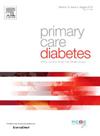The psychosis and type 2 diabetes service model (PODS) population profile study
IF 2.6
4区 医学
Q3 ENDOCRINOLOGY & METABOLISM
引用次数: 0
Abstract
Objective
To describe diabetes care received and views of people with severe mental illness (SMI) and type 2 diabetes (T2D) in an inner-city primary care setting.
Design
A cross-sectional study of adults with SMI and T2D from two primary care localities in south London.
Methods
Medical record data was extracted on annual diabetes review and participants invited for telephone interview.
Results
125 adults participated, 37 completed interviews. 43 % were female, 48 %, 35 % and 16 % were: Black African/Caribbean, White, Asian/other ethnicity. Mean age= 59.47 years (SD:12.68), diabetes duration= 8.62 years (SD:6.10), systolic blood pressure (BP)= 133.42 mmHg (SD:17.28), diastolic BP= 81.42 mmHg (SD:8.93), BMI= 33.17 m/kg2 (SD:7.22), HbA1c= 61.64 mmol/mol (SD:25.18). Older age (OR:1.06, 95 % C.I.:1.0, 1.10), shorter diabetes duration (OR:0.90, 95 % C.I.:0.84, 0.97) were associated with target HbA1c< /= 58 mM. Younger age and Black ethnicity were associated with BP> 140 mmHg (OR:0.94, 95 % C.I.:0.90, 0.98; OR:0.08 (95 % C.I.:0.01, 0.56). Being older was associated with cholesterol, < 5.0 mmol/mol (OR:1.06, 95 % C.I.:1.01, 1.11). Questionnaires demonstrated low physical activity, alcohol/drug use, diabetes distress, psychiatric symptoms. Interviews indicated that > 50 % wanted more support with SMI and T2D.
Conclusions
Younger, black people with SMI and T2D are potentially at greater cardiometabolic risk. Interviews suggest people with T2D and SMI group require more mental health and diabetes support.
精神病和 2 型糖尿病服务模式 (PODS) 人口概况研究。
目的:描述在市中心初级保健机构中患有严重精神疾病(SMI)和2型糖尿病(T2D)的人接受的糖尿病护理和看法。设计:对伦敦南部两个初级保健地区患有重度精神障碍和T2D的成年人进行横断面研究。方法:抽取年度糖尿病回顾病历资料,并邀请参与者进行电话访谈。结果:125名成年人参与,37人完成访谈。43 %为女性,48 %,35 %和16 %为:非洲/加勒比黑人,白人,亚洲/其他种族。= 平均年龄59.47岁(SD: 12.68),糖尿病持续时间= 8.62年(SD: 6.10)、血压(BP) = 133.42 毫米汞柱(SD: 17.28),舒张压= 81.42 毫米汞柱(SD: 8.93),体重指数= 33.17 m / kg2 (SD: 7.22)、糖化血红蛋白= 61.64 更易与摩尔(SD: 25.18)。年龄较大(OR:1.06, 95 % ci:1.0, 1.10)、糖尿病病程较短(OR:0.90, 95 % ci:0.84, 0.97)与目标HbA1c 140 mmHg相关(OR:0.94, 95 % ci:0.90, 0.98;Or:0.08(95 % c.i.:0.01, 0.56)。年龄越大胆固醇越高, 50% %的人需要更多的SMI和T2D支持。结论:患有重度精神分裂症和T2D的年轻黑人可能有更大的心脏代谢风险。访谈显示,重度糖尿病和重度糖尿病患者需要更多的心理健康和糖尿病支持。
本文章由计算机程序翻译,如有差异,请以英文原文为准。
求助全文
约1分钟内获得全文
求助全文
来源期刊

Primary Care Diabetes
ENDOCRINOLOGY & METABOLISM-PRIMARY HEALTH CARE
CiteScore
5.00
自引率
3.40%
发文量
134
审稿时长
47 days
期刊介绍:
The journal publishes original research articles and high quality reviews in the fields of clinical care, diabetes education, nutrition, health services, psychosocial research and epidemiology and other areas as far as is relevant for diabetology in a primary-care setting. The purpose of the journal is to encourage interdisciplinary research and discussion between all those who are involved in primary diabetes care on an international level. The Journal also publishes news and articles concerning the policies and activities of Primary Care Diabetes Europe and reflects the society''s aim of improving the care for people with diabetes mellitus within the primary-care setting.
 求助内容:
求助内容: 应助结果提醒方式:
应助结果提醒方式:


